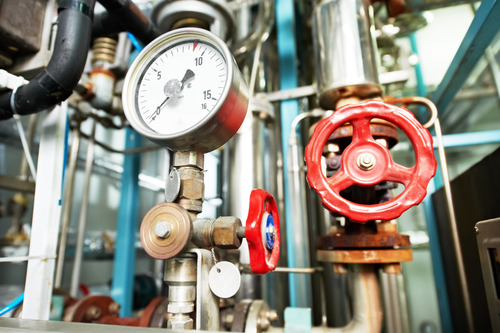When your boiler stays in good condition, it will last a lot longer. Boiler repair becomes necessary at some point in time. The old “ounce of prevention” can save you a lot of cure down the road. As its winter time you will need your boiler to function at its best.
Check the Thermostat
 Keeping your thermostat in good working order is vital. Firstly, check to ensure it is perfectly level if it is not digital. In the case of digital units, you still need to inspect to make sure that any manual air vents are open. Be certain that you allow the system to heat up adequately before you check the temperature, as this takes time. In the case of digital units, it is wise to check any hard wiring at least once a year to ensure that it is intact. Rodents, dry rot and water intrusion can all become serious issues if you leave them unchecked. In the case of a battery-powered system, avoiding boiler repair on this end can be as simple as inspecting the condition and charge level of the batteries.
Keeping your thermostat in good working order is vital. Firstly, check to ensure it is perfectly level if it is not digital. In the case of digital units, you still need to inspect to make sure that any manual air vents are open. Be certain that you allow the system to heat up adequately before you check the temperature, as this takes time. In the case of digital units, it is wise to check any hard wiring at least once a year to ensure that it is intact. Rodents, dry rot and water intrusion can all become serious issues if you leave them unchecked. In the case of a battery-powered system, avoiding boiler repair on this end can be as simple as inspecting the condition and charge level of the batteries.
Water and Pilot Lighting
When your boiler’s water level becomes too low, it can cause your system to crack violently. This sudden release of pressure is both potentially expensive and potentially dangerous. In order to avoid this type of boiler repair and the overall damage a broken boiler can cause, check the water level every two weeks. In most cases, all you have to do is alter the setup to ensure that your plumbing lines are bringing enough water to keep the level reasonable. Another way you can avoid a future boiler repair is to ensure that your pilot light is still lit. Natural gas or excessive coldness can both cause their own types of damage if you forget to do this.
Flue Made Who?
Checking the flue passages above your boiler can do more than avoid a future boiler repair that could be costly. It can also maintain the health of everyone in your home or building. The flue carries away carbon monoxide, but it is also a useful barometer of how well the system is operating and can give you a heads up of problems that are still in their early stages. When your flue passages are covered in soot, you have what is called a “rich” burning system, which means too little air is coming in for clean burning. You want to have as little soot buildup as possible, as this can lead to a need for premature boiler repair or even replacement. You also want to ensure that there is no water or other moisture in your vent pipes, as this means the system is not heating up enough.
Another way you can nip boiler repair in the bud is to check for a white and powdery residue within the vent pipe. This condensation is not just a warning about the system being too cool — it is acidic enough to go through the pipe over time. From there, you may have carbon monoxide where people breathe it and become sick.
Filters, Fins and Flipping Dirt
Dirt is a natural part of operation, but cleaning up that dirt is vital to avoiding unnecessary boiler repair. If you find dirt on the fins of your fans or blowers, clean it off as thoroughly as you can. Change any air filters to be sure you’re blocking dirt and letting air through, so as not to over-stress the fan and blower motors. Contact us for more information.
FAQ Section: Boiler Repair Insights
1. How often should I check my boiler’s thermostat?
To ensure optimal performance, inspect your boiler’s thermostat every month. For non-digital models, verify it’s level. Digital thermostats require annual checks for wiring issues. Regular inspection prevents minor issues from escalating, ensuring your heating system runs smoothly and efficiently all winter.
2. What should I do if my boiler’s water level is low?
If your boiler’s water level is low, immediately adjust the plumbing lines to restore proper levels. Low water can cause severe damage, including cracking. Check the water level bi-weekly to avoid costly repairs and maintain safety. Keeping the water level balanced is crucial for your boiler’s longevity.
3. How can I keep my boiler’s pilot light lit?
To keep your boiler’s pilot light lit, regularly inspect and clean the pilot assembly. Ensure the gas supply is stable and free of obstructions. If the light goes out frequently, it might indicate a deeper issue, requiring professional attention to avoid potential hazards and ensure consistent heating.
4. Why is my boiler’s flue important?
The boiler’s flue is crucial for venting harmful gases like carbon monoxide. Regularly check for soot buildup, which indicates improper combustion. Clean flue passages ensure efficient operation and protect household health. A clear flue prevents premature boiler repair or replacement due to acidic condensation and corrosion.
5. How can I detect early boiler issues?
Early detection of boiler issues involves regular checks of safeties, thermostats, water levels, and flue passages. Look for signs like unusual noises, leaks, or inconsistent heating. Catching problems early can prevent costly repairs and ensure your boiler operates efficiently and safely.
6. What are the benefits of a digital thermostat for my boiler?
Digital thermostats offer precise temperature control, enhancing boiler efficiency. They’re less prone to inaccuracies and can significantly reduce energy waste. Upgrading to a digital thermostat is a cost-effective way to improve your heating system’s performance and longevity.
7. How can I prevent boiler leaks?
Prevent boiler leaks by regularly inspecting the system for any signs of corrosion or damage. Installing a carbon monoxide detector can alert you to leaks early on. Regular maintenance and professional inspections can help you catch and fix issues before they become serious.
8. Why is regular boiler cleaning important?
Regular boiler cleaning is vital to prevent dirt and debris buildup, which can reduce efficiency and cause damage. Clean fins, filters, and internal components to ensure smooth operation. Regular cleaning can extend your boiler’s life and prevent unnecessary repairs.
9. How does soot buildup affect my boiler?
Soot buildup in your boiler’s flue indicates inefficient combustion, leading to poor performance and increased repair costs. Regularly clean the flue passages to maintain proper airflow and efficient operation. Excessive soot can cause premature wear and require costly repairs.
10. What should I do if my boiler is making strange noises?
Strange noises from your boiler often signal issues like air in the system, low water pressure, or a failing pump. Address these sounds promptly by calling a professional to diagnose and fix the problem, preventing further damage and ensuring reliable operation.
Conclusion
Regular maintenance and timely repairs are essential for keeping your boiler in top condition. By addressing small issues early, you can avoid costly repairs and ensure a warm, safe home throughout winter. For expert assistance, contact a professional boiler technician.



